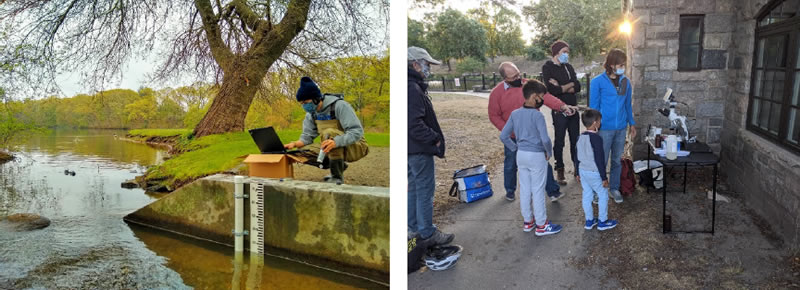The Stormwater Innovation Center: A Unique Opportunity in an Unlikely Place
November 2020
In 2017, managers in the city of Providence, RI found themselves with an unexpected opportunity. A consent decree had been issued by the State, which included a requirement for construction and maintenance of 42 separate stormwater projects within Roger Williams Park, a major undertaking to which the City committed $1.5 million. That commitment became a down payment on important lessons learned of the challenges of constructing and maintaining green stormwater practices. Implementing the required projects planted a kernel of innovation: "what if we documented all of these challenges and provided training and educational resources to prevent other municipalities from finding themselves in a similar predicament?" From that seed, the Stormwater Innovation Center was born: a Center focused on community outreach, education, and research.
With initial funding from EPA through Restore America's Estuaries, a pass-through entity for the Southeast New England Program, the Center launched in November of 2019 with three main objectives: 1) to provide training to organizations and municipalities on stormwater management and green infrastructure design and implementation; 2) to monitor green infrastructure for functionality and to determine best management practices and the proper length of maintenance; and 3) to provide public outreach and increase community engagement with stormwater management practices.
The Center is located in the heart of Roger Williams Park, which serves as a living laboratory to test innovative stormwater management and green infrastructure designs. Prior to COVID, the Center hosted regular training events to engage local community members in new stormwater management strategies. "That's one of the strengths of the Center and its location," said Brian Byrnes. "Of the trainings that we've done prior to COVID, we would do a half-day in class and then take these participants -- engineers, DPW workers, homeowners, facility managers-- into the practices to have them do the actual maintenance [in the field]." And because of the unique landscape of the park, "we can mimic almost anything that you would see in an urban [stormwater] setting."

The hands-on component of the Center adds an important learn-by-doing element that has been well-received by local community members and event attendees. During our interview for this article, Brian shared that he was recently attending an outdoor meeting when he noticed a woman cleaning out leaf debris from her local storm drain. When he stopped to thank her, she remarked that she had recently attended an event at the Center and understood the importance of keeping the drains clear.
Like most other programs, COVID-19 has adversely impacted the Center and prevented many of the in-person trainings that had been planned. In the interim, the Center has focused primarily on digital outreach by boosting its online profile and providing as many training materials and interactive webinars as possible on its website. Additionally, the Center has continued regular stormwater monitoring in partnership with the Universities of Rhode Island and New Hampshire, as well as ongoing development of maintenance programs for existing BMPs. While future funding for the program remains a challenge, the program has generated significant interest at all levels of government, proving the necessity and value of the stormwater education and outreach that the Center provides.
For more information about the Stormwater Innovation Center, please contact Ryan Kopp ([email protected]) or visit their website at https://www.stormwaterinnovation.org
